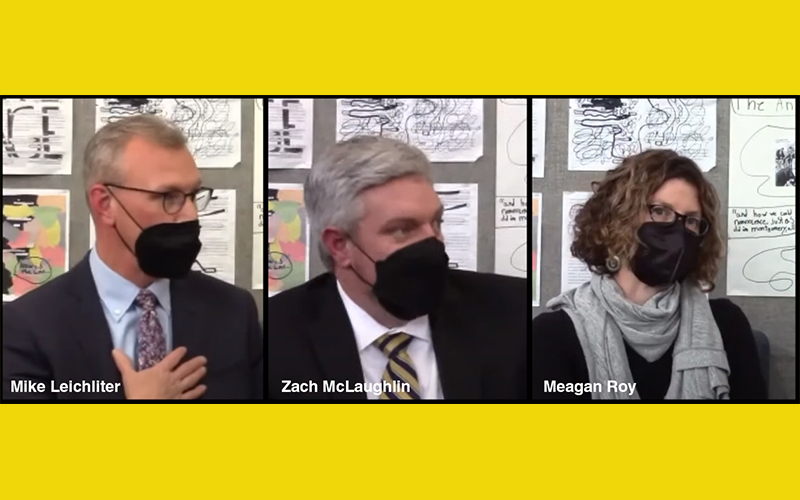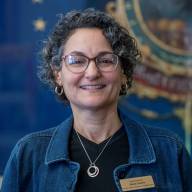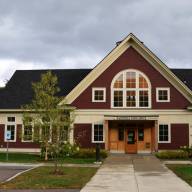Beginning on July 1, 2022, the Harwood Unified Union School District (HUUSD) will have a new superintendent. The board contracted with the search firm McPherson & Jacobson to identify candidates. The firm conducted community meetings and a survey in 2021 to craft the job description and the board narrowed the selection to three top candidates.
Those candidates are Mike Leichliter, superintendent of Penn Manor School District, Pennsylvania; Zach McLaughlin, superintendent of Springfield School District, Vermont; and Meagan Roy, director of student support services, Champlain Valley School District, Vermont. Roy and McLaughlin are both also finalists for the position of superintendent at nearby Washington Central Unified Union school district, which is conducting a similar interview process.
Earlier this week, the three candidates took tours of HUUSD schools and met the principals of the six schools in the district. They each went through a 30-minute interview with community members, administrators, educators and students. Interviews are available to view on Harwood Union’s YouTube channel. Community members were asked to complete a survey at https://huusd.org/superintendent-search by midnight on Wednesday, February 2.
ZACH MCLAUGHLIN
McLaughlin, who was named 2021 Superintendent of the Year, has been the superintendent in Springfield since 2013. Both of his parents were public educators and he followed in their paths as a high school social studies teacher, assistant principal, assistant superintendent, then superintendent. He also taught English in China. He said his guiding principles are authenticity and approachability. He asks all staff in his district to provide annual anonymous feedback on his job performance.
He stressed the importance of diversity, equity and inclusion in schools and communities, citing his experience in the Peace Corps in post-apartheid South Africa emphasizing that need. “If we want our schools to be the great equalizer, we need to do things to address the needs of all students,” he said.
When asked about a conflict he has helped resolve in his district, McLaughlin talked about ongoing discussions on teaching critical race theory in schools. Some community members and school board members had expressed concern that faculty was allegedly pushing its political views on students. “There was a lot of anger and incorrect information about what was happening in schools,” he said. He approached the heated conversations by promoting a civil dialogue. “Let’s try to use the processes and procedures and have conversations based on evidence and facts – be totally transparent,” he said. “Sometimes you need to get into the weeds with everybody and give them opportunities to make judgment … I believe in those dialogues. That’s what educational leaders need to do.”
He was asked about his strategies to support the well-being and success of staff and students after three years impacted by the COVID-19 pandemic, and what he thought was needed to help students recover. He noted that principals and administrators he’d talked with in the HUUSD told him of the drastic need for substitute teachers to accommodate teacher absences, as well as the resulting exhaustion for many educators. He also talked about COVID’s impact on students’ social emotional learning. “If you want to get results you have to have students in a spot where they can learn, and that means addressing the social emotional needs not being met.” He called recovering from the pandemic a “multi-year process to regain what was lost.”
McLaughlin was asked why the HUUSD would be a good fit for him. “I’m still trying to assess that,” he said. “I see a whole bunch of things working.” In the community surveys done by McPherson & Jacobson and conversations he’d been having with the community, he said trust and accessibility of leadership were topics that continued to come up. He talked about the work he’d done in Springfield over the last decade to build trust between the district leadership and the community. “That’s what I do,” he said. He said he sees the role of superintendent as “listener-in-chief in the community.”
MIKE LEICHLITER
Finalist Mike Leichliter is currently the superintendent of the Penn Manor School District in Lancaster, Pennsylvania, a position he’ll retire from this summer. He has served as superintendent in that district as well as high school assistant principal, middle school principal and assistant superintendent. Leichliter told the students, educators, administrators and board members interviewing him that he and his wife both started their careers as middle school teachers and said their youngest daughter is in her last year at UVM. He fielded a variety of questions about his experience and educational philosophy including one asking him why he felt Harwood would be a good match.
“I’ve been so impressed with Harwood. My wife and I wanted to go somewhere where we felt part of the community, and we believe in what they do. I’ve been learning about your community since September. I’ve seen the love of learning and sense of community that your students have. I want to be in a place where I can contribute and learn and that’s the sense I get from Harwood. Having our daughter here in Vermont, we’ve really fallen in love with Vermont and the people here and the position. This is the only place where I’ve applied,” Leichliter said.
Earlier in the interview he shared that his school district was in its third year of finishing a $100 million renovation project to bring the school into the 21st century.
Under questioning from the interviewers, Leichliter said he feels the job of a superintendent is to support teachers and ensure that everything he does is focused on how to improve the educational environment.
“I see myself as more of a coach, whether working with teachers on curriculum or classroom, or working with students,” he said.
He shared his experience working with two opposing groups on a complicated issue of idle school scheduling, noting that bringing the two groups together came down to listening to both sides and then, ultimately, making a decision while acknowledging that one group did not get what it wanted. In that instance, he said, making sure that the group that did not prevail felt heard and safe and supported was a lesson that stayed with him for the next 20 years.
In response to questions about helping students and staff navigate COVID and a post-COVID learning environment, Leichliter said it was important first to acknowledge everyone’s frustration and what people have been through.
“We don’t know what next year will look like. We thought this year would be easier and it’s been more challenging than last year. I’ll want to have conversations with staff and have some kind of an advisory group with staff and faculty to see what they feel is important moving forward,” he said.
Clark asked Leichliter about his experiences with equality and anti-racism issues.
“This is an area of real passion for me,” he said, recounting an experience in his school when a group of white students decided to wear white shirts in a show of racial unity and in opposition to the small percentage of students of color at the school.
“We started having conversations with students about why and had a couple of very difficult days. At the end there was a feeling in our community that we needed to sweep it under the rug and not deal with it. The principal at the time said ‘we’re not going to bury it. We’re going to deal with it.’ And we had conversations and really started to change hearts. That work went on for a number of years,” he said, noting that later, as more students of color enrolled in the school, the focus became on academic performance and dealing with those discrepancies for students of color as well as economically disadvantaged students.
“The first step is to be open and have the conversations and understand where people are and help people move along in their journeys to recognize bias. The last step is to decide what we’re going to do about it,” he said.
MEAGAN ROY
The final candidate interviewed was Meagan Roy, director of student support service for the Champlain Valley School District. Her background is in special education, inspired by having a brother with a disability. She got into school leadership because, “I wanted to continue to make sure schools work for all kids.” She said she values innovative, inclusive education and working collaboratively to achieve that goal.
When asked about a time that she brought together people with opposing views, she talked about consolidating five different schools’ approach to special education in her district, convening leaders of different schools to create a set of guided principles that “allowed us to balance individual unique nature of the schools with a common vision.” She called herself an “authentic listener to other perspectives.”
She was asked about the strategies she would employ to support educators and staff, as well as students, in this stage of the pandemic. “I’m glad that’s on the minds of the board,” she said. “It’s a really hard time to be in education. People are frustrated at the situation. One of the strategies I think is really important is taking stock of the work we’re asking teachers to do and asking ‘where are our kids, what do they need?’ We also have to figure out being clear about what we ask of teachers and give permission to use time to take care of themselves, have good conversations with teachers about what they need.” On the student side, she said educators need to “step back, look at the data, what did we learn? What are students struggling with? Some students need something different.” She said data can help assess, “How do we figure out how school is working for them on the social/emotional side?”
When asked about her approach to equity, Roy said, “We need to make sure our schools feel welcoming for all of our students. There are inequities that happen that we don’t see, that are not overt and are about disabilities. The goal is to try to figure out how do we take this big topic of equity and start to make it manageable? It’s a big topic and we have to have a common understanding of what won’t be tolerated and that’s kids not feeling safe and not feeling like valued members of the community.”
Finally, Roy was asked why the HUUSD would be a good fit for her. “I want alignment with the passionate belief of engaging kids, being innovative, supporting them when they need it. I look for a system that has that shared vision. I see that in Harwood. I look for a system that values education, values individuality of different communities and what they bring to the table, but also has a common understanding of where they need to go. I get excited about a system that values the people in the system. I really want to be part of a successful and cohesive team.”
The HUUSD school board will meet in executive session this week and select a finalist to offer the position to at its February 9 meeting.












